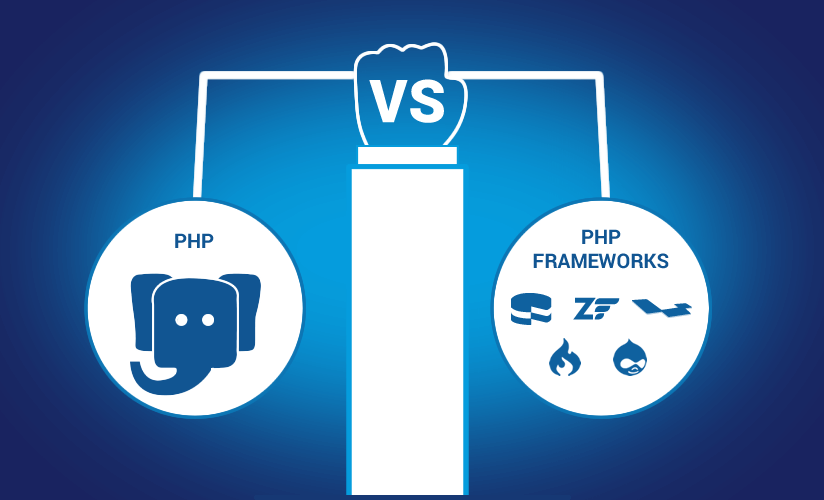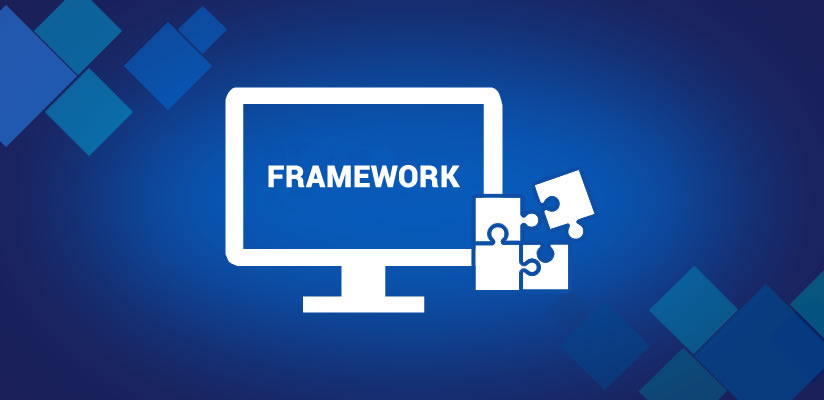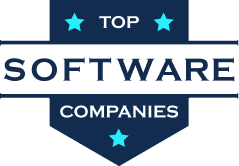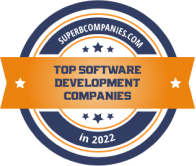Core PHP vs PHP Frameworks

PHP has been a cornerstone of web development for a long time. The LAMP stack (Linux, Apache, MySQL, and PHP) is still a frequently used part of web development, and it is something that people tend to learn in computing courses in college. Today, there are many other frameworks that web applications can be built upon, but PHP is still popular, and still has much value.
Frameworks and Web Development
 A framework is a collection of languages, libraries, and design patterns that come together to make it as easy as possible to build a web application. PHP is just one part of a framework, the programming language that everything else is built upon.
A framework is a collection of languages, libraries, and design patterns that come together to make it as easy as possible to build a web application. PHP is just one part of a framework, the programming language that everything else is built upon.
So, what’s the distinction between Core PHP and the PHP framework, and why does it matter in modern web development?
Core PHP
 Core PHP is a simple, bare-bones PHP programming language. It can be used to create web applications, and the beauty of it is that it is easy to set up and get running. You don’t need to install extra libraries. Core PHP is just “plain old PHP.” It’s pure PHP, with no confusing extras.
Core PHP is a simple, bare-bones PHP programming language. It can be used to create web applications, and the beauty of it is that it is easy to set up and get running. You don’t need to install extra libraries. Core PHP is just “plain old PHP.” It’s pure PHP, with no confusing extras.
To build a sophisticated dynamic web application in Core PHP, you would need to understand programming principles very well. This is both a blessing and a curse.
In some ways, building out a fully fleshed out application in Core PHP may mean ‘reinventing the wheel. There are a lot of useful functionalities built into the language, but it is not something that has everything already done for you. This means you have more control, but in some ways, it also means more work. Also, because some things are done from scratch, Core PHP puts a lot more into the developer’s hands, and the code that is produced may be more ‘personal’, and harder for another external developer to dive in and work on right away
PHP Framework
 PHP Framework, on the other hand, is PHP with additional libraries and functionalities. This means that a lot of common, often repeated tasks are more comfortable to do in PHP Framework because there are already things in place to let you do them with a few lines of code.
PHP Framework, on the other hand, is PHP with additional libraries and functionalities. This means that a lot of common, often repeated tasks are more comfortable to do in PHP Framework because there are already things in place to let you do them with a few lines of code.
PHP Framework is more standardized, so it is harder to write bad code. This means less time wasted on debugging, and it means that when you bring an external developer into work on something they can tell at a glance what is going on.
MVC Makes Things Easier
 For very small applications, Core PHP makes it easy to throw together some code, with minimal setup required. For more significant applications, this is not a good idea because it means that the code turns into a long, monolithic, and confusing document. The MVC model makes it a lot easier to write quality, robust code, by separating the logic from the style.
For very small applications, Core PHP makes it easy to throw together some code, with minimal setup required. For more significant applications, this is not a good idea because it means that the code turns into a long, monolithic, and confusing document. The MVC model makes it a lot easier to write quality, robust code, by separating the logic from the style.
MVC stands for Model, View, Controler. With this way of working, you can change how an application looks without having to change the backend code. It can feel like a longwinded way of doing things at first, but the more significant the application gets the clearer the benefits of this way of working become.
Frameworks offer a standardized way of doing things that are understood by the whole industry. They make it easier to do complex projects and offer a lot of useful debugging and management features, as well as labor-saving features for often-repeated tasks.
Why Do People Still Use Core PHP?
 If Frameworks are so good, then why do people still use Core PHP?
If Frameworks are so good, then why do people still use Core PHP?
Well, Core PHP is useful to learn because it provides people with a foundation for coding that allows them to work on any of the leading frameworks that are out there. Core PHP teaches you the absolute basics, and it teaches you how tounderstand what is going on under the hood.
If something goes wrong when you’re developing using a Framework, it helps if you understand PHP at the most detailed level, because you can trace through what is happening step by step.
Core PHP is useful when you’re dealing with performance constraints as well, since you can choose every library yourself and control precisely what is happening on the server, rather than having ‘too much’ going on at once.
Core PHP is useful for truly custom web development. The developer has more control over the code, and this can be a perk if the application needs to have its optimized performance line by line.
Which Should You Choose for Your Application?
 If you’re not sure what to use for your application, consider how sophisticated it is, what server it will be running on, and how many users it will have. All of these things matter when it comes to optimizing your code.
If you’re not sure what to use for your application, consider how sophisticated it is, what server it will be running on, and how many users it will have. All of these things matter when it comes to optimizing your code.
Our PHP development team in India is well versed in Core PHP and can also recommend PHP Frameworks that can suit most applications, and we would be happy to sit down and discuss the options with you to help you figure out the best choices for your site or application, depending on load.
For the end-user, it doesn’t matter what the application is running on, as long as it was an appropriate choice. The average web user has not heard of Laravel or Symfony, for example. All they care about is that they can log on to the website and get their work done, play their game, or message their friends. When things work seamlessly, people forget that there is any work being done at all.
We can help you with website and web application development using a range of frameworks, or in Core PHP. Based on your specifications, we will suggest a framework that will help you to get the job done, or build out everything you need from scratch. The choice of development tools matters, but the most important thing is the code, and a good developer can use almost any language or framework to get the job done.
Similar Posts

Advanced Techniques in Angular: Reactive Forms and Component Communication
Are you struggling to build complex and interactive forms for your Angular web applications? Do you find it challenging to manage data flow and communication between different components? Fear not, for we have the answers you seek! In this comprehensive blog, we will explore two powerful techniques in Angular that will revolutionize your form-building and […]...

ReactJS and AR/VR: Exploring the Possibilities for Business Applications
Are you a business owner searching for innovative ways to captivate your audience and stay ahead in today’s competitive landscape? Do you find yourself pondering the possibilities of combining the power of ReactJS with the immersive realms of Augmented Reality (AR) and Virtual Reality (VR)? Look no further! In this blog, we delve into the […]...

How Smart Contracts are Revolutionizing the Real Estate Sector
Are you tired of the cumbersome processes, excessive paperwork, and exorbitant costs associated with real estate transactions? Have you ever wondered if there’s a better way to buy or sell property in today’s digital age? Well, you’re not alone. In fact, according to recent studies, the real estate industry is plagued by inefficiencies, with an […]...






